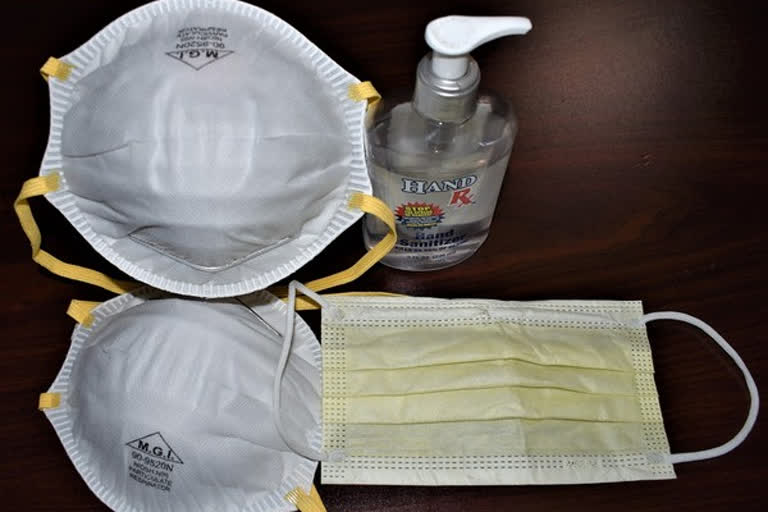Hyderabad: The Union Ministry of Health and Family Welfare issued detailed guidelines for home isolation of very mild or pre-symptomatic Covid-19 patients.
The fresh guidelines are in addition to guidelines on appropriate management of suspected or confirmed cases of COVID-19 issued by the Health Ministry on 7th April.
"As per existing guidelines, during the containment phase the patients should be clinically assigned as very mild or mild, moderate or severe and accordingly admitted to COVID Care Center, Dedicated COVID Health Center or Dedicated COVID Hospital respectively, " the health ministry stated.
Mild or pre-symptomatic patients having the requisite facility at their residence for self-isolation will have the option for home isolation, health ministry further added.
Eligibility for home isolation
- The person should be clinically assigned as a very mild case or pre-symptomatic case by the treating medical officer
- The person should have the requisite facility at their residence for self-isolation and also for quarantining the family contacts
- A caregiver should be available to provide care on a 24 x 7 basis. A communication link between the caregiver and hospital is needed
- The caregiver and all close contacts of such cases should take Hydroxychloroquine prophylaxis as prescribed by the treating medical officer
- Arogya Setu App must be downloaded on mobile and it should remain active at all times
- The patient shall agree to monitor his health and regularly inform his health status to the District Surveillance Officer
- The patient needs to fill an undertaking on self-isolation and shall follow home quarantine guidelines
When to seek medical attention
Immediate medical attention must be sought if serious signs or symptoms develop. These could include:
- Difficulty in breathing
- Persistent pain or pressure in the chest
- Mental confusion or inability to arouse
- Developing bluish discolourations of lips or face
- As advised by treating medical officer
The patients can discontinue their home isolation once symptoms are clinically resolved and the surveillance medical officer certifies him to be free of infection after laboratory testing.
Instructions for care-givers
- Mask:
- The caregiver should wear a triple layer medical mask appropriately when in the same room with the ill person
- The front portion of the mask should not be touched or handled during use
- If the mask gets wet or dirty with secretions, it must be changed immediately
- Discard the mask after use and perform hand hygiene after disposal of the mask
- The caretaker should avoid touching own face, nose or mouth
- Hand Hygiene:
- Hand hygiene must be maintained while being in contact with an ill person or his immediate environment
- It should also be practised before and after preparing food, before eating, after using the toilet
- Use soap and water for handwashing at least for 40 seconds
- Alcohol-based hand rub can be used if hands are not visibly soiled
- Use disposable paper towels to dry hands after washing hands. If not available, use dedicated clean cloth towels and replace them when they become wet.
- Exposure to a patient:
- Avoid direct contact with body fluids of the patient, particularly oral or respiratory secretions
- Use disposable gloves while handling the patient. Perform hand hygiene before and after removing gloves
- Avoid exposure to potentially contaminated items in his immediate environment
- Food must be provided to the patient in his room
- Utensils and dishes used by the patient should be cleaned with soap or detergent and water wearing gloves. The utensils and dishes may be re-used
- Clean hands after taking off gloves or handling used items
- Use a triple-layer medical mask and disposable gloves while cleaning or handling surfaces, clothing or linen used by the patient
- The caregiver will make sure that the patient follows the prescribed treatment
- The caregiver and all close contact will self-monitor their health with daily temperature monitoring
- They will report promptly if they develop any symptom suggestive of COVID-19
Instructions for the patient
- The patient should at all times use a triple-layer medical mask
- Discard mask after 8 hours of use or earlier if they become wet or visibly soiled
- Mask should be discarded only after disinfecting it with 1% Sodium Hypo-chlorite.
- The patient must stay in the identified room and away from other people at home.
- The patient must take rest and drink a lot of fluids to maintain adequate hydration
- Follow respiratory etiquette all the time
- Hands must be washed often with soap and water for at least 40 seconds or clean with an alcohol-based sanitizer
- Don’t share personal items with other people
- Clean surfaces in the room that are touched often (tabletops, doorknobs, handles, etc) with 1% hypochlorite solution
- The patient must strictly follow the physician’s instructions and medication advice
- The patient should self-monitor his or her health with daily temperature monitoring
- The patient must report promptly if develops any deterioration of symptom as detailed below
Also Read: over-13-million-children-did-not-receive-vaccines-in-2018-unicef



